Emirate trade the focus of Belarusian embassy
TUT interview with Belarusian Ambassador Roman Golovchenko
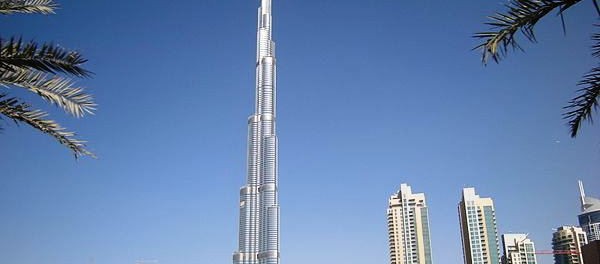 Photo by Leandro Neumann Ciuffo via Wikimedia Commons
Photo by Leandro Neumann Ciuffo via Wikimedia Commons
Belarus’ interest in the petroleum-rich Middle East seemed for years to have no chances of being reciprocated. Then, not long ago, both Belarus and the United Arab Emirates (UAE) exchanged visits at the highest level, and suddenly there emerged real projects, chances for export, and the flow of tourism. In order to find out how to do business on the Arabian Peninsula, what came of the high-level exchange visits with Belarus, and which Belarusian products are the best loved by the people of the UAE, TUT’s Olga Loikaw interviewed the Belarusian Ambassador to the United Arab Emirates Roman Golovchenko.
The formula for a successful relationship with the Emirates
TUT: In relations with countries that are geographically close to Belarus, everything develops logically and understandably, even for someone who is far removed from international diplomacy. There are personal contacts, tourism, culture, shared infrastructure, and then economic projects and full political interaction. But how does this work for countries that do not have historical ties or obvious common interests? What drives Belarus’ relationship with the UAE and other countries in the region?
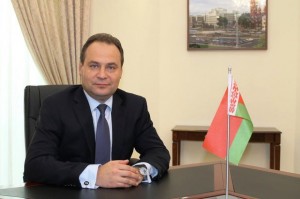
His Excellency Roman Golovchenko, Ambassador of Belarus to the United Arab Emirates. Photo via TUT.By
Golovchenko: Indeed, diplomatic relations between Belarus and the Arab states on the Persian, or as it is called here, Arabian Gulf were established just over 20 years ago. Unlike a number of Arab countries, such as Syria, Libya, Egypt, Iraq, and other countries that were part of the Soviet sphere of influence, the countries of this region had virtually no cultural, social, or political ties with Belarus until after the dissolution of the USSR.
Our relations first focused on personal contacts, particularly at the highest levels, which formed the basis for continued interaction. Today, we have at our disposal a high level of political contacts, and the trust of members of a number of ruling families of monarchies on the Arabian Peninsula.
TUT: Last year, the President of Belarus Alexander Lukashenko flew to Belarus. Did you sense any effect from the visit?
Golovchenko: Each visit by our head of state is carefully calculated, prepared, and aimed at solving specific problems in bilateral relations. The effect of such visits, either direct or indirect, is always there. Additionally, the contracts and agreements signed during such summits lays the foundation for future relations. The 2013 visit allowed discussion with the UAE on outlines of main projects that further our joint relations. So in addition to quantitative growth of Belarusian exports, Belarus secured “most favored nation” status and a “green light” among economic interests in the Arab Emirates for Belarusian projects, and this is a very important signal to the political and business elite of the Arabian monarchies. Now it’s up to Belarusian enterprises to take advantage of the situation.
TUT: In addition to official state visits, information visits have occurred, like during the 2013 Formula 1 Abu Dhabi Grand Prix last November. People back home are always skeptical about such visits.
Golovchenko: Personal contacts in the Middle East are one of the key elements to successful collaboration. In the Middle East, if you are invited, accepting an invitation is not just a courtesy, it is a sign that you are among the select few with whom you are ready to talk with and ready to work with. So the Formula One event, or any other event, is nothing more than a backdrop to such meetings. If you meet with someone at a high level, it is a sign for local big business that you are someone they can deal with. In turn, our country for 20 years ensured that the UAE’s policies were open and fair to us. This approach by them we respect and appreciate.
TUT: “Emirates.” The word is regarded as a standard for highly developed infrastructure. Just about everyone can be heard saying at any time that “if only we could find the money, we could build the Emirates.” Is oil money the secret to success for this country?
Golovchenko: The fundamentals of sustainable economic growth were established in the UAE during the 1970s. This was thanks, in large part, to hydrocarbon exports, from which a significant amount was reinvested in infrastructure and industry. Because of the wise and far-sighted policy of the country, it managed to reduce the oil sector to 30 percent of the economy. The other 70 percent of the Emirates’ gross domestic product (GDP) is in construction, aluminum, cement, chemical fertilizers, pharmaceuticals, ceramics, clothing, food, transportation, and travel services. The benefits that came from the favorable world market prices for oil are used for economic modernization.
TUT: And where do you see its petroleum wealth being used?
Golovchenko: In the territory of the UAE, mainly. It’s barren desert, but domestic investment of petroleum wealth is going into construction of desalination plants that allow the country to plant some 200 million trees and develop profitable and successful agricultural enterprises. For example, Belarus’ favorite childhood wild berry, the strawberry, is now grown in the UAE and exported, even to Europe. There is a project to plant in the desert a palm forest in order to lower the annual temperature in Abu Dhabi by 2 degrees Celsius (nearly 4 degrees Fahrenheit). Maybe that’s not a lot of temperature change, almost unnoticeable to the simple layman, but it is a real rolling back of the deserts of the country, and an internationally recognizable effort to conserve forests and minimize the effects of global climate change. By the way, Belarus took part in this project with the UAE. We supplied the peat and introduced methods of creating fertilized land from the sand on the site.
Another example of embedding petroleum wealth into the economy is the construction of the world’s first city with zero emissions of hydrocarbons. It will have infrastructure to support 90,000 – 40,000 who are permanent residents and 50,000 who will commute to the city each day. It will be called Masdar City (named for the Mubadala Development Company subsidiary, the Masdar renewable energy company – the name literally means “source” in Arabic) and will be built 17 kilometers from Abu Dhabi in one of its suburbs (near the International Airport). It will be a highly-planned, specialized, research and technology-intensive municipality with campuses for students and teachers (similar to KAUST, Saudi Arabia, and Tsukuba Science City in Japan). In November, the headquarters for the German-founded International Renewable Energy Agency (IRENA) will open here. Belarusian citizens, by the way, are working at the agency and will be teaching in Masdar City. The Embassy is actively working on connecting our country to projects in the field of renewable energy, which will be implemented under the auspices of IRENA.
TUT: Middle Eastern economics – what is its market? How liberal is its legislation and does the state actively intervene in the process?
Golovchenko: The UAE government is implementing a strategy for turning the country into a regional and global center for entrepreneurship through a policy of minimal intervention in business and effective partnership between public and private sectors. However, the state will not allow the economy to drift, and it takes part in coordinating and managing it. In 2013, it produced a seven-year development plan with an ambitious goal to increase the country’s GDP by 67 percent. In general, the role of the state in the economy is high enough: fiscal policy is held tight, and unjustified rises in prices and speculative activities are not permitted and stopped. The state does not directly set the prices, but for some items there controls to limit markups. The largest operators of the real estate market are in the oil sector. Energy, transportation, and communications all belong to the state. The Emirate government is modernizing its economy by stimulating ties between the private sector and the non-oil sectors, as well as development of scientific research and modern technology. With a few exceptions, there is no VAT and income tax in the UAE.
TUT: There is certainly a lot of willingness to invest in the UAE under these conditions.
Golovchenko: This is a country with very active capital inflows, including from unstable regions. After the start of the so-called Arab Spring, many companies moved their capital to the UAE.
TUT: There were fears that the protests could spread to the affluent Emirates.
Golovchenko: It doesn’t have the socio-economic soil for that. The standard of living is very high. Disclosure of salaries is not permitted here, but there are a great many citizens from prosperous countries with high incomes, such as from the United States and Canada, and they obviously do not earn less here than they do in their home countries.
For UAE nationals, and their part of the population is growing rapidly – about half of these are under the age of 25 – the state has created favorable conditions. This cuts the ground from under those who try to escalate tensions. Investment in education and health began here long before the start of protests in the region. There is a high level of patriotism here – they recently introduced compulsory military service, and most people regard it with great enthusiasm. In this society, there is an understanding that you cannot just take from the state, you must also give something in return.
The terms of the export spurt
TUT: We have already mentioned the growth of Belarusian exports to the UAE after the president’s visit last year. According to statistics from the first quarter of the year, it has grown phenomenally, by 2.4 times, and in the last year by almost three times. What has caused such a jump?
Golovchenko: The main share of exports is petrochemical products, such as synthetic fibers and filaments, acrylonitrile, polyamides, and synthetic fibers. But another important category of traditional exports from Belarus sent to the Emirates is food products, shipment of which increased their cost here. Still, it is nice to see on the shelves of local supermarkets Savushkin curd products, Brest-Litovsk sour cream, and Santa Braemar fish products. Significantly, 2.4 times as many cigarettes from Hrodna tobacco factory Neman were sent to the UAE (following the president’s visit). We also supplied bearing, ferrous metals, optical instruments, and electrical equipment. Another important category of products sent in 2013 were knitwear and textiles, clothing, bedding, and of course the famous Belarusian brand of lingerie Milavitsa.
After a 5-year hiatus, we again began shipping MAZ (Minski Autamabilny Zavod, or Minsk Autoworks) vehicles. This market is still small and includes the world’s largest producers. To enter this market, we needed great efforts and investment in promotion. It is important to find partners who will promote, and necessary to cut off those who just talk a lot and do little. Last autumn we opened a MAZ dealership, and sent the first batch of vehicles. Now we can show potential customers what we sell, not just virtually, but in reality. They can be touched, bought, owned. We’ve also successfully developed military and technical collaboration.
TUT: What should Belarusian enterprises consider when trying to enter the Emirate market?
Golovchenko: The favorable geographical position, uncomplicated procedures for registering companies and developing trade, transportation, and logistics infrastructure make this country attractive to foreign companies and investors. So there is a high level of competition. The local market is filled with the world’s leading manufacturers of products , all of whom offer attractive conditions to acquiring them (leasing, installment payments, favorable credit terms, etc.).
Despite the fact that general business standards and etiquette correspond to Western models, there are some features associated primarily with Muslim cultural traditions. Islam has profoundly impacted the world of politics and business, and the Arab style of doing business is thoughtfully slow. People in the Emirates love and know how to bargain, and they regard non-verbal communication as important. Arab partners have a need to show respect, to make sincere compliments. It should be borne in the mind that an Arab will rarely be heard to say “no,” but rather they will often express a negative answer in evasively uncertain terms.
When building a business, you need to consider that negotiations made before a deal often take more time than they do in Western business practices. Another specificity of the Middle East – if goods cannot be touched, then they are not. This implies the need to be prepared to bear the cost to ensure the availability of product samples in the UAE. Under these conditions, in the forefront of an active marketing policy should include the physical presence of the goods in the market and at exhibitions, and there should be secured a distribution network. The sales of products here must include warranty and service. It’s important to have a local partner in the country who is endowed with dealership rights, or is a foreign producer representative. This increases the confidence of potential customers.
Companies in the UAE can be registered I the country or within free economic zones (FEZs). The main advantage of a FEZ is that companies created there are 100 percent owned by the investor, while elsewhere a local partner must own at least 51 percent of the company. This, of course, is preferable for Belarusian state-owned companies. Through this option, it is possible to deliver goods on the domestic market with the payment of a 5 percent customs duty while conducting production activity within the FEZ. The peculiarities of the local business environment require planning for low efficiency in distribution. It is desirable to establish personal contact with the decision maker.
TUT: Which sectors of the Belarusian economy have captured the interest of businessmen from the UAE?
Golovchenko: In attracting foreign direct investment from the UAE, there are some difficulties associated with both conservative investors, who prefer to work in markets that are more familiar, such as the United States or the European Union, as well as within the country, and the fact that the investment interests of Emirate companies and organizations do not always coincide with the investment priorities of Belarus. Belarus relies on attracting investment in high-end manufacturing and export-oriented projects. The preferred form of foreign investment serves the establishment of joint ventures and foreign enterprises to implement projects in “greenfield” categories. An Emirate investor is generally interested in real estate, infrastructure and resource projects, trade and tourism, and portfolio investments. In other words, in highly profitable projects with a fast payback.
There is some potential to attract Emirate business in agriculture, real estate, tourism, trade, and catering. At the beginning of the year, Belarus had 14 enterprises in the Emirate capital (Abu Dhabi). Our country’s interest is to serve as a place to invest capital in the contest of increasing participation in the Eurasian Economic Union, with the prospect of the three states eventually forming into a single market.
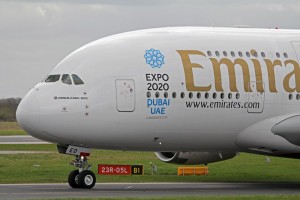
Expo 2020 bid by Dubai featured on Emirates Airways jet. Photo by Ken Fielding via Wikimedia Commons
TUT: Dubai will host the Expo 2020 World Fair. Is there any sense of preparation happening already for this event?
Golovchenko: Dubai and Abu Dhabi, along with the other Emirates, within the capitals is always felt that there is a preparation for some significant event. The urban landscape has changed even in the past few months. But with regard to the Dubai Expo 2020, the world’s most famous architects and design bureaus have already developed a master plan for the site, which will incorporate a total area of 438 hectares (1082 acres) set within the Jebel Ali District, along the Dubai side of its boundary with Abu Dhabi. The project is estimated to cost 4 billion USD. One of the highlights of the Expo is an initiative to rent spaces for small countries using funds generously allocated by the government of the UAE. By 2020, the Dubai International special economic zone is planned for completion. It will be built next to the Expo site, and include construction of four new airport terminals with a capacity to serve 200 million passengers a year. The cost of this infrastructure development will be about 32 billion USD.
Public displays of affection can result in a fine and deportation
TUT: What was your first impression of the Emirates?
Golovchenko: I knew this region for a long time by the time I arrived in the late 1990s. My first impression was probably like everyone else’s – it’s hot. But it was very impressive how this country progressed so rapidly. It took, of course, a certain amount of time to get used to the fact that no one here is in a hurry. Many things here take more time that we would like them to.
TUT: How many Belarusians visit the UAE now? I know it grows every year. And does the flow of traffic go in the opposite direction?
Golovchenko: Every year, the number of Belarusian tourists grows. They are attracted by the sea, safety, convenience, logistics, and the shopping. The Emirates are especially popular in the autumn and spring; these are peak seasons. Meanwhile, the flow does exist in the other direction. In 2013, the number of calls to the embassy for entry visas has increased; in comparison with 2012, the increase has been by 35 percent. For UAE nationals, Belarus is especially attractive during the period between May and September, when the heat and humidity levels make them look for a place to stay with a more comfortable climate. The demand is starting to pick up for residents here and in other Gulf states for environmental and health-oriented tourism, and popular hunting tours.
Despite the traditional orientation of Emirate tourists to go to the UK, France, and Switzerland, the work of the embassy to promote the image of Belarus is bringing about results. UAE nationals are attracted to Belarus because of the high level of security, the friendly attitude toward foreigners, cleanliness and orderliness of the cities, and the beauty of the natural resources. Evidence of Belarus’ ability to capture a growing interest among Emirate residents is that despite the traditional lack of interest in hockey in the UAE, the World Hockey Championships in Minsk in May brought to the country two official delegations and many spectators.
What has been important in increasing the number of trips made by citizens of both countries to each other has been an increase in the number of direct flights between Minsk and Abu Dhabi. Since June 2013, Etihad Airways has operated such flights daily.
TUT: The traffic is of course important to good relations. But even more iconic is visa facilitation. Is there movement in this direction?
Golovchenko: We’ve already obtained an agreement on the abolition of visas for diplomatic passports. Now we are working on simplification of the visa regime for all citizens of both countries. This is not a quick process. There are plenty of consultations. But I think within a year we will have come to some decisions.
TUT: Do you often get calls from Belarusians who get into trouble in this country? What are some typical problems?
Golovchenko: Our citizens do not get into trouble so often in the UAE, but it happens. In 2013, the embassy had to provide consular legal assistance for 35 Belarusian citizens who found themselves in difficult situations. The most simple were loss of documents. The most complex issues we’ve had to deal with was probably the export of children born in the Emirates from out of wedlock Belarusian nations, with children being left without parental care. The laws in the country are largely based on Shariah Law, which prohibits pre-marital sex, and there is a problem with paperwork for children born out of wedlock. You should also remember that in cases of divorce that involve a UAE citizen’s child, the court awards custody to the father.
Despite the fact that the UAE is the most open to foreign tourists among all the Gulf states, local governments impose quite stringent requirements for those who wish to visit the Emirates, so typical issues arise from non-compliance with the norms and rules of behavior: emerging drunk from a public place, or wearing clothes that are too revealing in public, or even the public display of affection.
Quite often we also have problems related to the work of our citizens in the UAE. Usually it is that the employer does not comply with the conditions of the employment contract and UAE law regulating labor relations: confiscation of employee passports, denial of leave and compensatory time, delay in the payment of wages and compensation for dismissal. It is important to carefully read the terms of contracts here before signing, to scrutinize applicable rights and responsibilities, and overall specificity of the proposed work to UAE labor law. In the event of a dispute, of course, citizens can always contact the embassy.
TUT: Belarusians are traveling more frequently around the world, creating more international families, but they do not always understand the difference in the culture and traditions of different people. What is important to know about and comply with in a trip to a Muslim country?
Golovchenko: Most of the rules of conduct in the UAE stem from the state religion, Islam, as well as local traditions formed over centuries under the influence of the indigenous Bedouin population and their way of life. For foreign visitors to the UAE, women wearing tradition Muslim clothing, such as the abaya, in public places is not as necessary as in, for example, Saudi Arabia. However, to avoid trouble, women need to not wear clothes that are too revealing. They must be modest in appearance and avoid touching men in public. There are also strict limitations associated with the use of alcohol. Consumption is permitted only in special places that are licensed to sell alcohol (hotels and restaurants where foreign tourists stay and gather). It is unacceptable to be in a public place while under the influence, and to drive while intoxicated. These incur severe penalties.
It should also be borne in mind that cohabitation and extramarital affairs in the UAE are criminal acts. It must be remembered also that during the Muslim holy month of Ramadan, foreigners should refrain from eating, drinking (even water or juice), and smoking in public places (the Muslim faithful are prohibited from these activities while the sun is up during this time).
TUT: How many Belarusians currently reside in the Emirates? Is there a typical story about Belarusians who come to the country, perhaps in search of learning, business, or marriage?
Golovchenko: Legitimate grounds for extended stay of Belarusian citizens on the territory of the UAE is the residence visa, which is issued for up to three years. The number of Belarusian citizens who are based in the UAE with a residence visa is constantly increasing. There are now over 2,000 people.
We can say that the typical citizen of Belarus residing in the UAE is a young person, either man or woman, aged 25-30, college-educated, multilingual, and working in retail or the service sector. Belarusian citizens can be found in the offices of major foreign companies and international organizations with offices located in the UAE, many of who eventually return to Belarus with new knowledge and international experience. In the UAE, universities operate with Belarusian teachers, and some Emirate athletes are trained by Belarusian coaches.

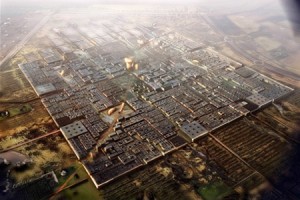
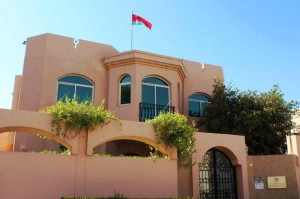

Leave a comment